Introduction
In today's fast-paced digital landscape, businesses are increasingly turning to cloud-managed solutions to optimize their operations. These solutions offer a multitude of benefits, including substantial reductions in infrastructure costs, enhanced scalability, and improved data security. By shifting the focus from traditional hardware management to understanding customer consumption requirements, companies can achieve greater agility and responsiveness to market demands.
Moreover, cloud services facilitate seamless collaboration across geographically dispersed teams, fostering innovation and driving significant returns on investment. This article delves into the various advantages of cloud-managed solutions, their impact on operational efficiency, the critical role of Managed Service Providers (MSPs) in cloud adoption, and the importance of automation and optimization strategies in maximizing cloud benefits. Through real-world case studies, it further illustrates how businesses can leverage these technologies to maintain a competitive edge in the ever-evolving digital economy.
Benefits of Cloud Managed Solutions for Business Operations
Cloud-managed solutions offer significant advantages for businesses looking to optimize their operations. By utilizing online computing technologies, organizations can significantly lower infrastructure expenses and improve scalability. For example, a leading service provider successfully distinguished itself in a competitive market by preparing to open 18 new data centers globally, all while strategically managing expenses and capacity planning. This approach allows companies to shift their focus from hardware management to understanding customer consumption requirements.
Moreover, the flexibility offered by online services allows rapid changes to market needs, removing uncertainties linked to different pricing models. This increased responsiveness fosters innovation and enhances collaboration across geographically dispersed teams. The significance of concentrating on business goals instead of just operational enhancements cannot be exaggerated, as it guarantees that investments generate substantial value.
Cloud solutions also lead to improved data security through advanced encryption and regular updates, protecting sensitive information against cyber threats. Research from Infoblox shows that users of sophisticated management practices achieve an average return on investment (ROI) of 334%, along with a 75% boost in operational efficiency. These advantages highlight the essential function of online computing in propelling business achievement and sustaining a competitive advantage in today’s digital environment.
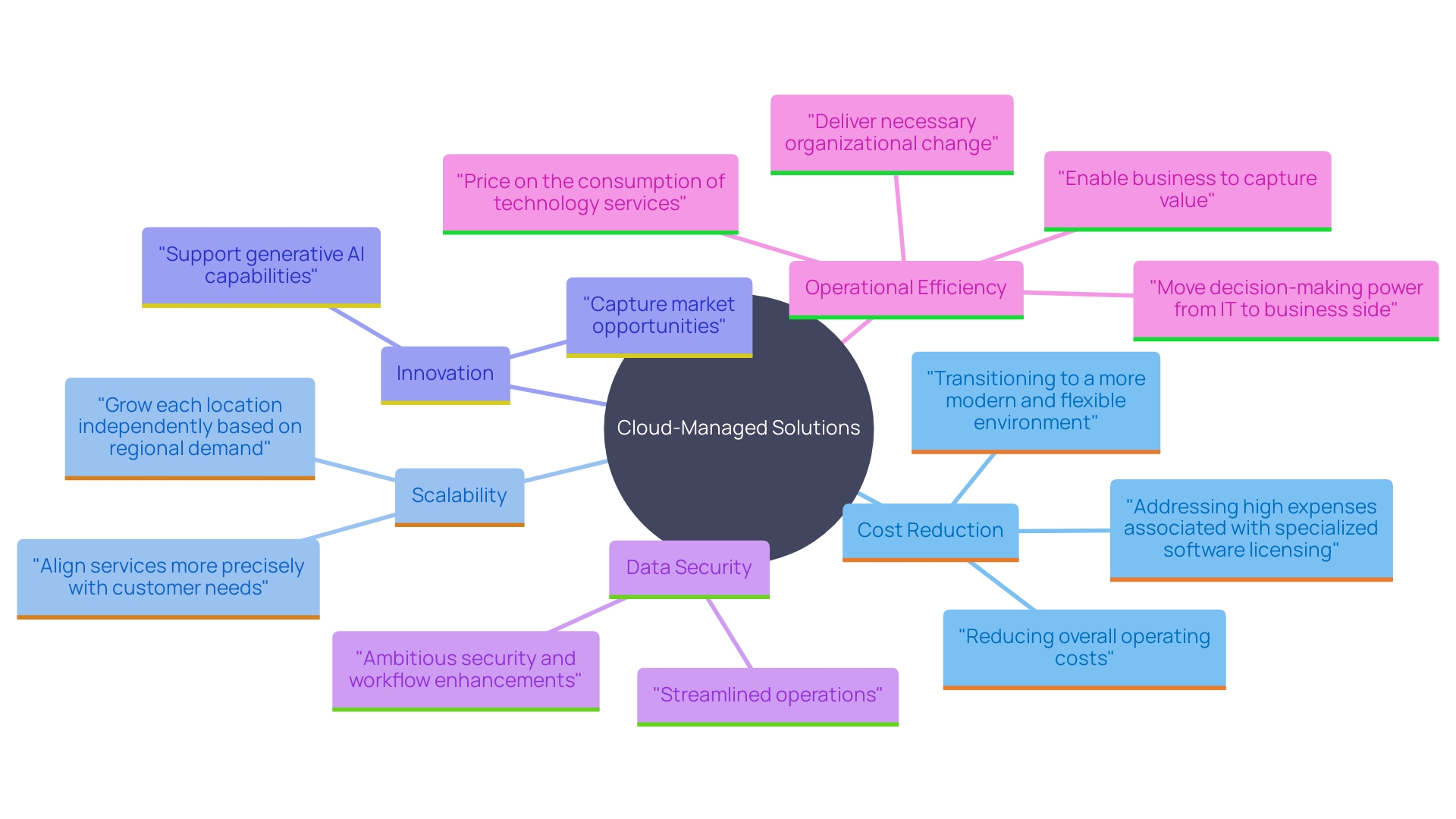
Enhancing Operational Efficiency with Cloud Services
Utilizing online services can significantly improve operational efficiency by automating routine tasks and streamlining workflows. By utilizing cloud-based tools for project management, communication, and data analysis, organizations can reduce the time spent on manual processes. This shift enables employees to focus on strategic initiatives, driving productivity and better resource allocation. Furthermore, service providers manage maintenance, upgrades, and security, further lowering costs. The scalability of online computing is especially beneficial, enabling organizations to swiftly adjust resources to accommodate varying needs, whether for extra storage or processing capacity. This flexibility is ideal for companies experiencing rapid growth or seasonal demand spikes. With data and applications available from any location, online computing encourages remote work and teamwork, dismantling geographical obstacles. This accessibility ensures that teams can work together seamlessly, regardless of location, fostering innovation and agility. As organizations continue to maneuver through the changing digital environment, online computing remains a fundamental element of contemporary enterprise strategy, enabling firms to innovate more rapidly and function with greater efficiency.
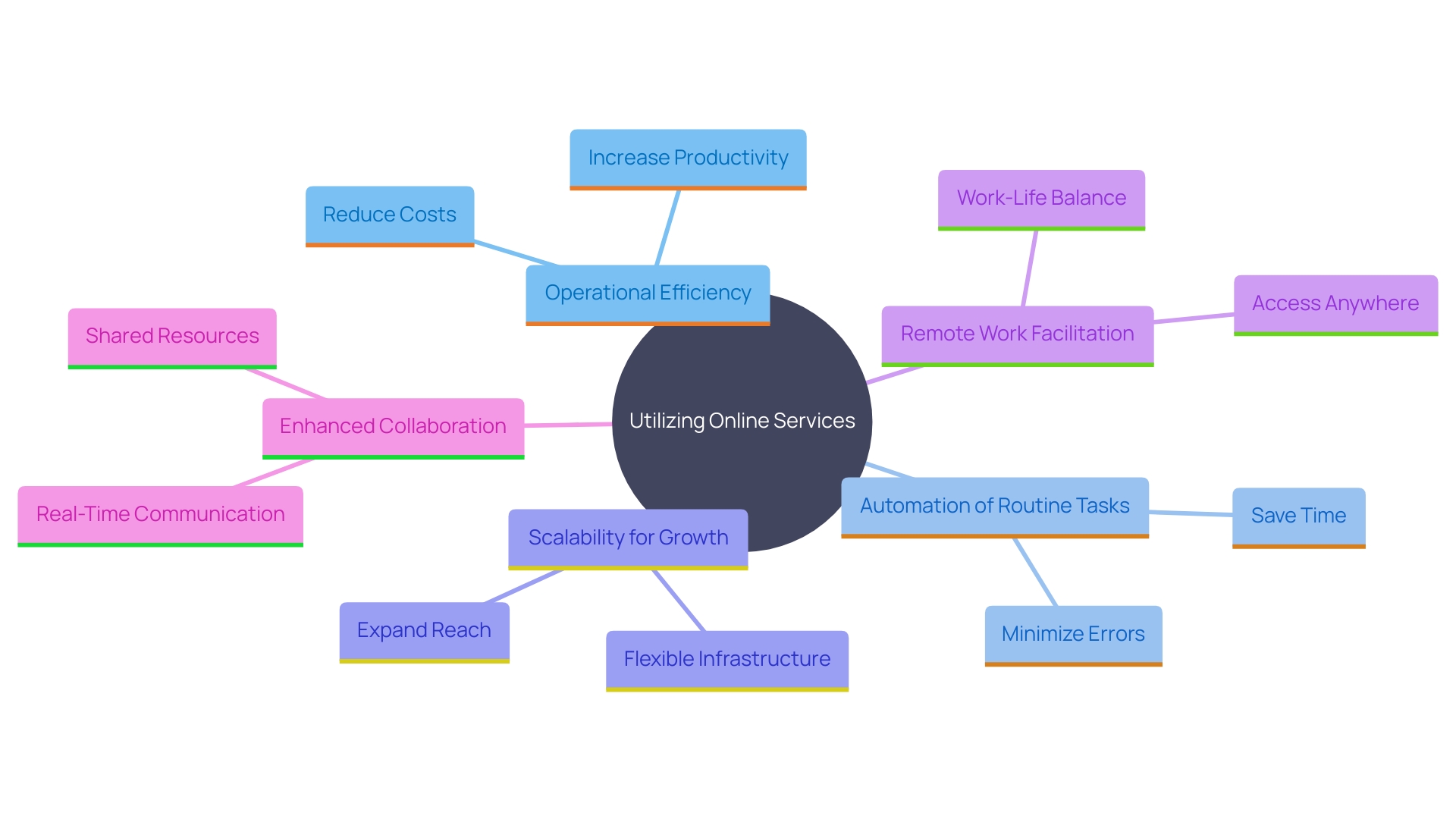
Role of Managed Service Providers (MSPs) in Cloud Adoption
Managed Service Providers (MSPs) play a crucial role in enabling the adoption of online services for enterprises by addressing the complexities and challenges associated with migration to these resources. Strategic planning with experienced MSPs is essential to achieve the complete advantages of online services. Based on studies, 90 percent of IT leaders depend on service providers for successful transitions to remote computing, highlighting the importance of expert assistance in this process.
MSPs support organizations in examining their current infrastructure and assessing the compatibility of existing systems with online environments. This involves devising comprehensive migration strategies that ensure smooth transitions while mitigating potential roadblocks. Cost considerations are critical, encompassing both initial investments and long-term operational expenses. MSPs provide insight into evaluating total cost of ownership, potential savings, and hidden expenses, facilitating informed decision-making.
Safety is another crucial issue during online data transfer. MSPs assist organizations in evaluating the security measures of prospective service providers to guarantee data protection and adherence to industry regulations. 'This emphasis on security is vital, as 43 percent of migration delays are linked to worries about data and IT safety.'.
Additionally, MSPs provide continuous assistance and management, enhancing performance and tackling technical challenges as they occur. This ongoing assistance is crucial as 68 percent of participants indicated that less than half of their IT environments had been transitioned to an online infrastructure, with 35 percent facing halted projects due to heightened complexity and security issues.
In addition to their expertise in planning and security, MSPs also enhance operational efficiency through integration and automation. Research indicates that 85 percent of MSPs prioritize IT management offerings with built-in automation capabilities, leading to significant time and cost savings. By utilizing these advanced solutions, organizations can optimize IT operations, enhance scalability, and guarantee dependable online performance.
In summary, MSPs are indispensable in navigating the intricacies of migration, providing the necessary expertise, security, and support to ensure successful and efficient adoption for enterprises.
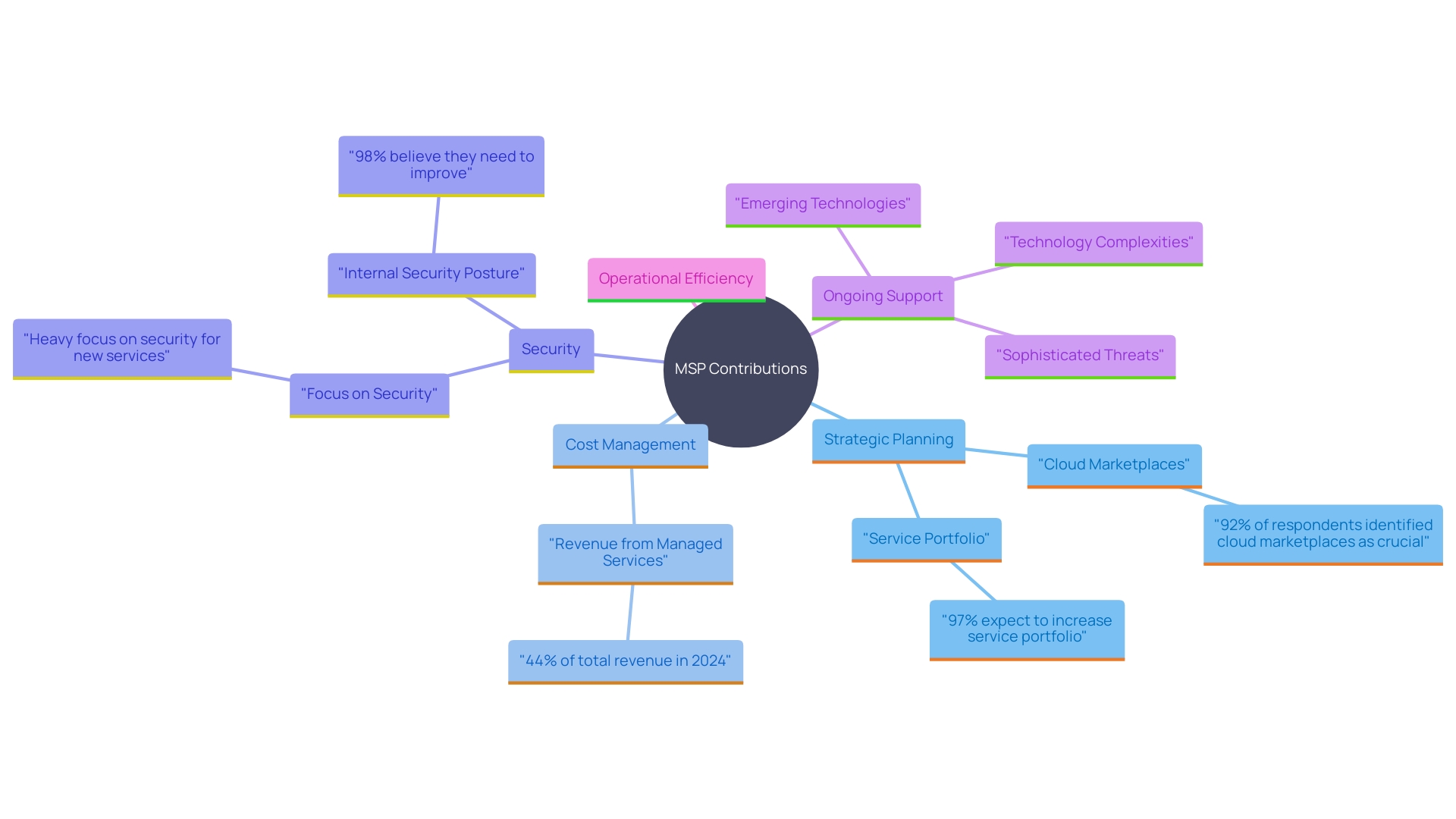
Leveraging Automation for Operational Efficiency
Automation is a crucial component in improving business activities within virtual environments. By automating repetitive tasks like data entry, reporting, and system monitoring, organizations can significantly reduce human error and boost efficiency. Leveraging cloud-based automation tools enables real-time data processing and analytics, facilitating quicker decision-making and a more agile response to market dynamics.
For instance, Ryanair has effectively utilized process automation to standardize its disaster recovery procedures, minimizing the risk of human error. Additionally, their auto-remediation processes ensure that incidents like a non-responsive web server at 3 A.M. are promptly addressed through automated alerts and actions, only involving human intervention when necessary. This approach not only enhances operational reliability but also ensures security and compliance. Previously, it took Ryanair's engineers two weeks to compile evidence for SOX compliance auditors; now, process automation provides a self-service portal for auditors, streamlining the process.
Furthermore, the incorporation of AI-powered analytics in online environments can enhance resource distribution, guaranteeing cost reductions and improved efficiency. AI algorithms can analyze consumption patterns and performance indicators to determine the best configurations for online resources, promoting proactive resource management and maximizing return on investment.
Automation in online environments also assists in the establishment of new job roles. Research from MIT highlights that while industrial robots may impact jobs and wages in some areas, companies like Amazon have demonstrated that automation can generate new employment opportunities, with over 700 new categories of skilled jobs created. This shift allows human employees to focus on more complex, non-repetitive tasks that require higher skill levels and creativity.
In conclusion, automation not only streamlines business operations but also fosters innovation and strategic growth by enabling organizations to respond swiftly to evolving market needs.
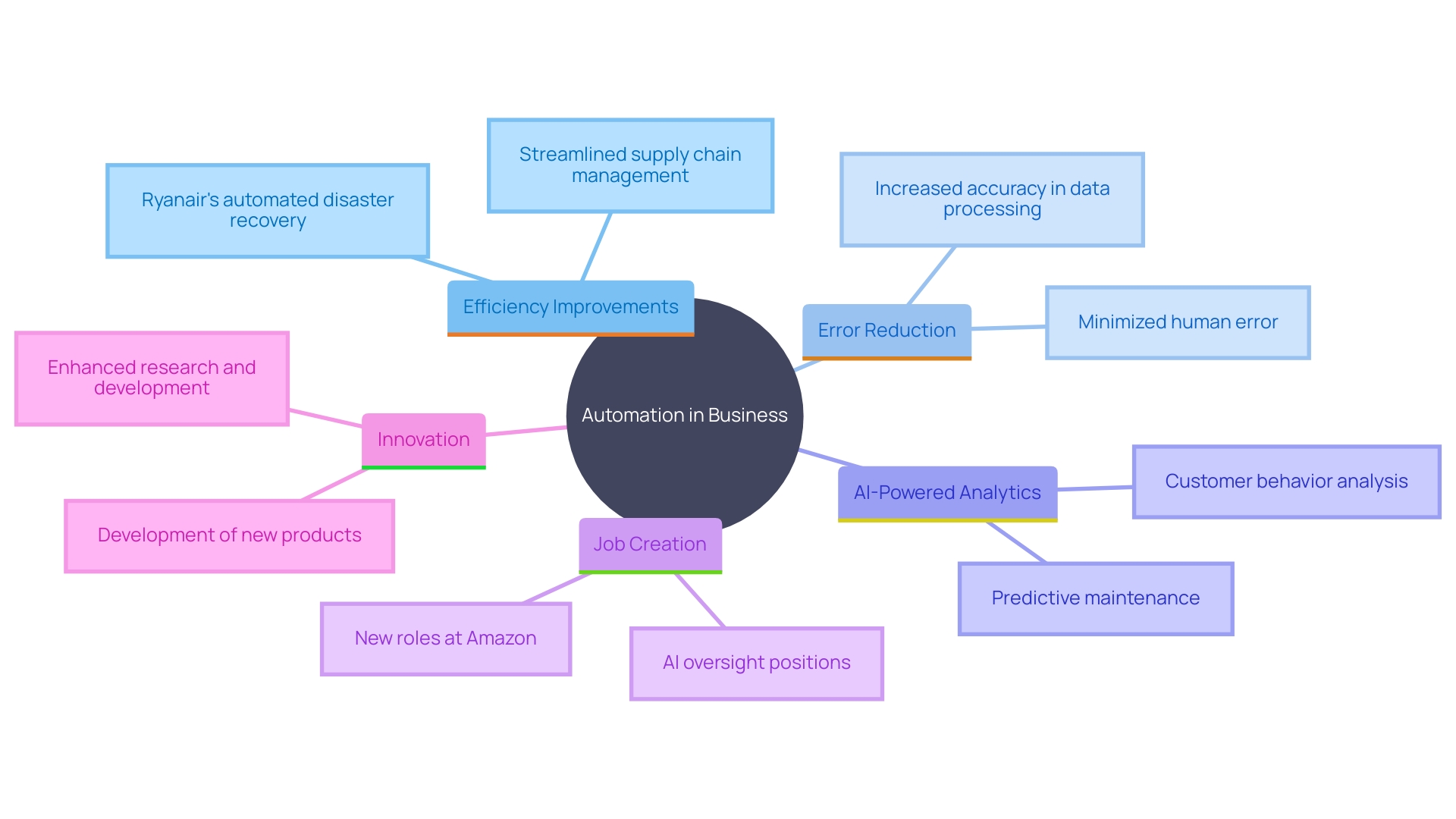
Cloud Optimization Strategies
To maximize the advantages of managed services, organizations should implement strong optimization strategies. This includes routinely assessing usage and performance metrics to identify areas for improvement. Leveraging optimization algorithms, as used by Azure Core Insights Data Science Team, can help in finding near-optimal solutions within reasonable time and resource constraints.
Organizations should also focus on rightsizing cloud resources based on real-time demand. This approach guarantees they pay solely for what they utilize, reducing expenses while enhancing efficiency. As noted by Simon Bacher, CEO of Ling, right-sizing is crucial for maintaining cost-effectiveness and meeting specific organizational needs.
Furthermore, cooperation between FinOps and development teams is crucial to estimate expenses accurately and recognize possible savings. Monthly analyses can validate these projections and highlight areas for further optimization. This strategic method not only improves scalability and performance but also aligns with business goals such as expense reduction and agility.
Considering increasing data storage expenses influenced by elements such as AI adoption and inflation, efficient expense management is more crucial than ever. A survey by Forrester shows that a quarter of budgets for online services are often wasted. Therefore, keeping a watchful eye on spending in the digital environment and consistently enhancing it is crucial for organizations seeking to succeed in the online age.
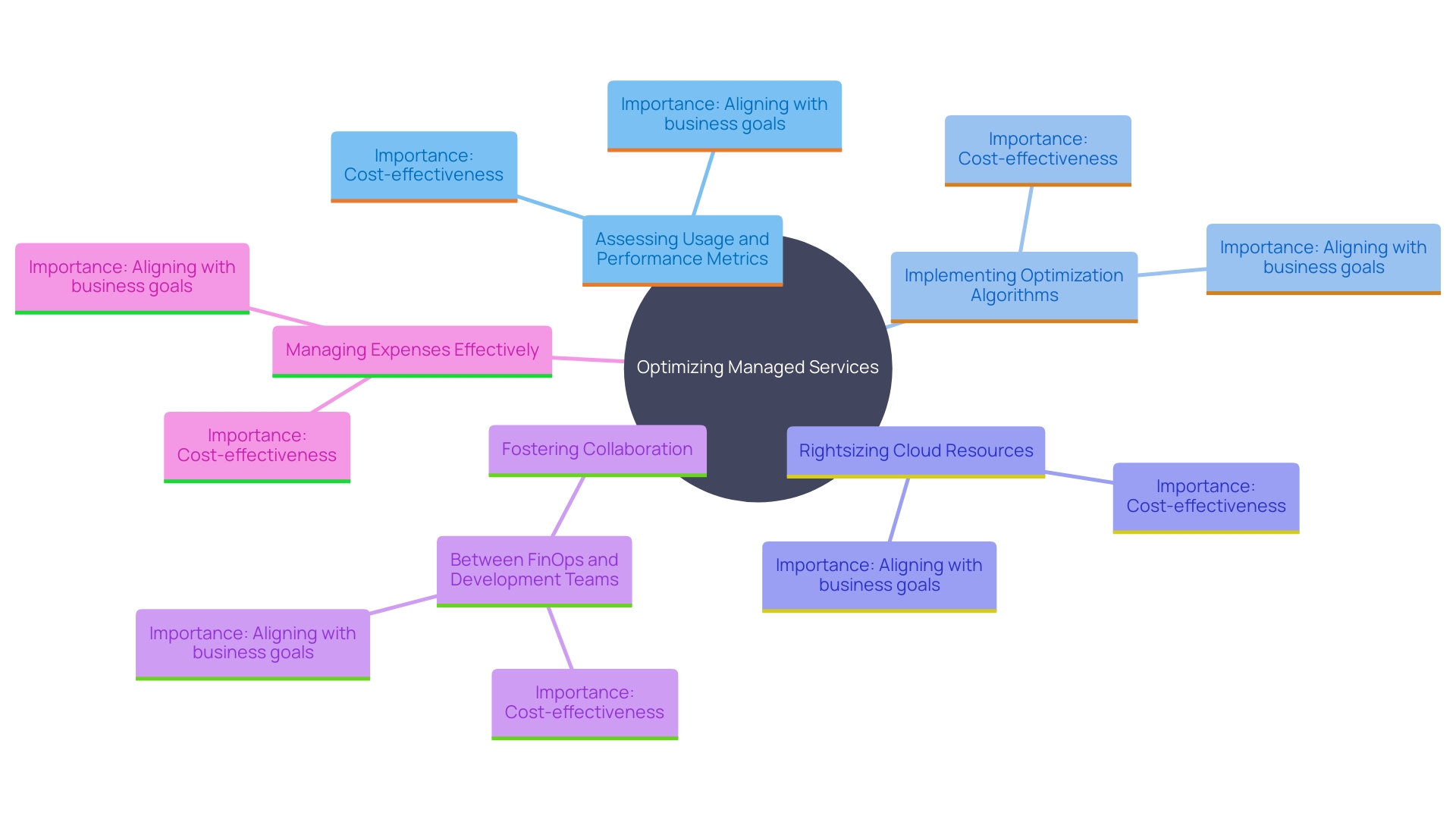
Case Studies: Real-World Examples of Cloud Optimization Success
Analyzing actual case studies of companies that effectively improved their processes through managed services can offer useful insights. For instance, the Travel Charme Strandhotel Bansin, a prominent hotel in Germany, significantly streamlined its operations by utilizing online technology. The hotel, which accommodates approximately 250 visitors every evening, employed online services to oversee its reservation systems, dining bookings, and overall property administration, leading to improved efficiency and better guest experiences.
A similar success story can be seen in the retail sector. Software developers Layla and Lee Gladwin developed a unified e-commerce platform, inventory management, and in-store EPoS system after identifying significant inefficiencies in existing retail systems. Their solution, Saledock, addressed the fragmented and clunky systems that many retailers struggled with, leading to better customer support and an overall improved shopping experience.
Furthermore, a prominent service provider collaborated with Insight to embrace a flexible strategy for service delivery. This strategic shift enabled the company to scale efficiently across a global customer base, eliminating uncertainties associated with varying pricing structures and better managing costs and capacity planning. This level of agility and differentiation in digital services has allowed the company to meet unique customer demands swiftly and effectively.
These success stories demonstrate the tangible advantages of cloud services and act as motivation for other organizations aiming to improve their operational efficiency. By adopting cloud-managed solutions, businesses can achieve greater agility, reduce overhead costs, and improve service delivery, ultimately driving innovation and growth in their respective industries.
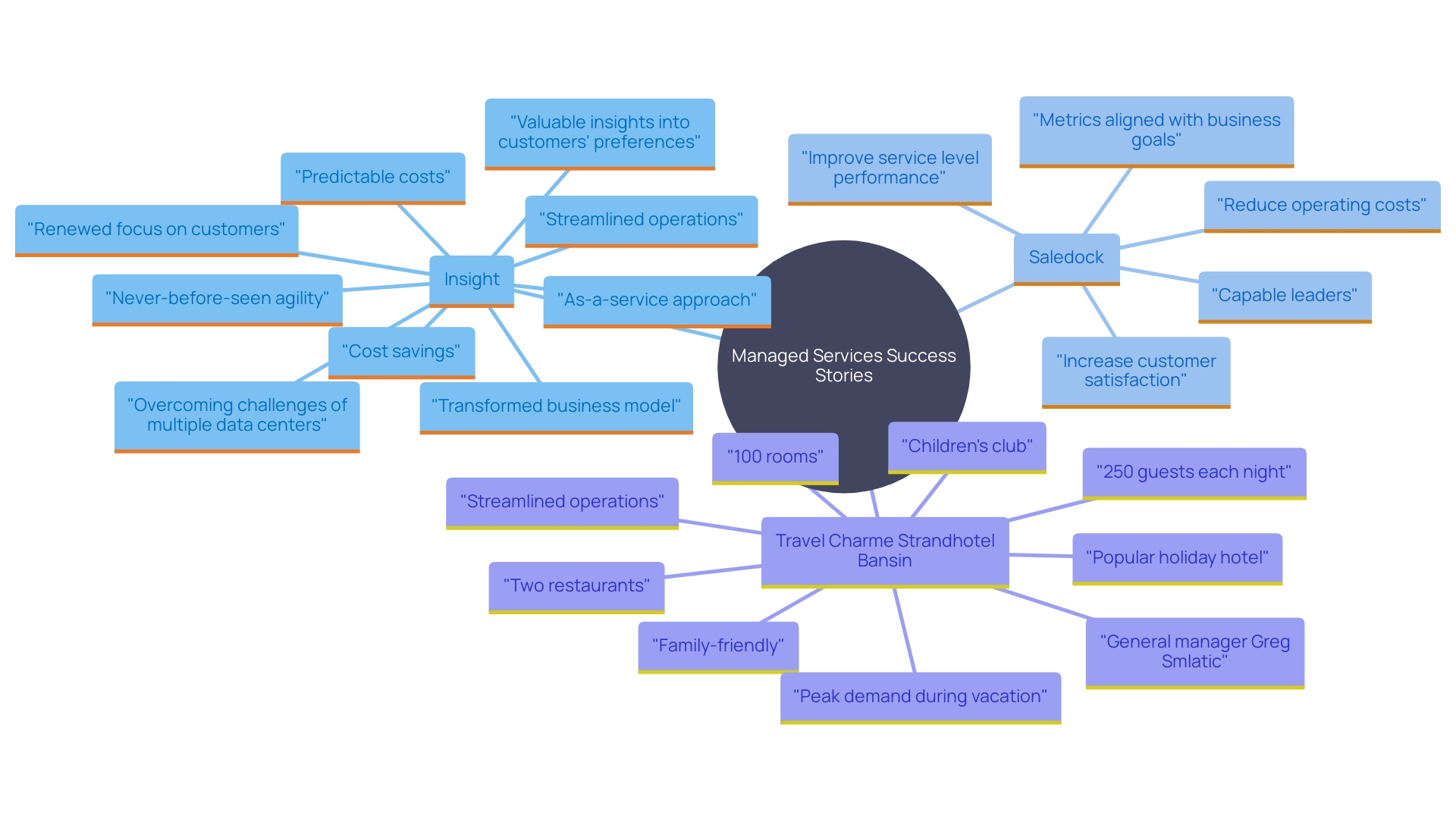
Conclusion
The exploration of cloud-managed solutions reveals a transformative potential for businesses aiming to enhance operational efficiency and drive innovation. By reducing infrastructure costs and improving scalability, organizations can shift their focus from traditional hardware management to understanding customer consumption needs. This adaptability not only fosters a more agile response to market demands but also enhances collaboration across teams, paving the way for increased innovation and improved returns on investment.
The critical role of Managed Service Providers (MSPs) in facilitating cloud adoption cannot be overlooked. Their expertise in navigating the complexities of cloud migration ensures that businesses can leverage cloud technologies effectively, addressing security concerns and optimizing performance. The partnership with MSPs enables organizations to make informed decisions regarding their cloud strategies, ultimately leading to successful and efficient cloud adoption.
Moreover, the integration of automation within cloud environments significantly boosts operational efficiency. Automating routine tasks allows employees to focus on strategic initiatives, enhancing productivity and resource allocation. As demonstrated in various case studies, the successful implementation of cloud solutions across different industries underscores the importance of adopting robust cloud optimization strategies.
These strategies not only aim to maximize cost-effectiveness but also align with overarching business objectives, ensuring that organizations remain competitive in an increasingly digital landscape.
In conclusion, the strategic adoption of cloud-managed solutions, supported by expert guidance from MSPs and the integration of automation, positions businesses to thrive in today's dynamic market. By embracing these technologies, organizations can achieve enhanced agility, improved operational efficiency, and sustained growth, ultimately securing a competitive edge in the digital economy.




